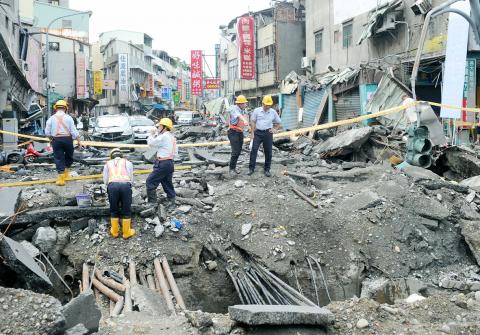Experts have called for the government to install a comprehensive pipeline monitoring system to avoid a repetition of the gas explosions that took place in Greater Kaohsiung on Thursday night and early Friday morning, causing at least 28 deaths and leaving 286 people injured.
Petrochemical companies have vast networks of underground pipelines in Kaohsiung, said Chen Chih-yung (陳志勇), professor of chemical engineering at National Cheng Kung University.
“To prevent such a tragedy from recurring, we must have transparency. People have the right to know the real information,” said Chen, who also serves on the board of CPC Corp, Taiwan (CPC, 台灣中油) as an independent director.

Photo: Wang Min-wei, Taipei Times
“The government should inform the public where the petrochemical pipelines are buried, then a monitoring system must be installed for the entire petrochemical pipeline network in the city. Also, the government must establish standard operating procedures for emergency responses,” he said.
Chen said the most important thing now is for the government to calm public fears.
“Of course, we must find out who is responsible for the gas explosions, but that is not the priority at this time,” he said. “The first thing to do is to tell the public where the pipelines are laid and where there are no pipelines. Like when an earthquake strikes, information on the epicenter is reported on the news, so people can be alert.”
However, Chen said he knows that if maps of underground pipelines were published, they might affect real-estate prices.
“However, people have the right to know. To understand a situation better can help in prevention. It’s not knowing what and where [the pipelines are] that is most frightening to people,” Chen said.
“CPC is the top boss of Taiwan’s petrochemical industry, so it should be the first to come out and make a comprehensive examination of all the old and aging pipelines,” he added, saying that all petrochemical companies have installed pressure gauges at both ends of pipelines, which help to detect leaks.
However, he said he was not sure whether there are pressure gauges throughout other sections of pipe and added that there are other engineering methods to check on leaks.
“For example, in culvert pipes, monitoring devices are installed at regular intervals. It costs more money to install such systems and there are other factors considered. So we are not sure whether Taiwan’s petrochemical companies have done so,” Chen said.

Authorities have detained three former Taiwan Semiconductor Manufacturing Co (TMSC, 台積電) employees on suspicion of compromising classified technology used in making 2-nanometer chips, the Taiwan High Prosecutors’ Office said yesterday. Prosecutors are holding a former TSMC engineer surnamed Chen (陳) and two recently sacked TSMC engineers, including one person surnamed Wu (吳) in detention with restricted communication, following an investigation launched on July 25, a statement said. The announcement came a day after Nikkei Asia reported on the technology theft in an exclusive story, saying TSMC had fired two workers for contravening data rules on advanced chipmaking technology. Two-nanometer wafers are the most

Tsunami waves were possible in three areas of Kamchatka in Russia’s Far East, the Russian Ministry for Emergency Services said yesterday after a magnitude 7.0 earthquake hit the nearby Kuril Islands. “The expected wave heights are low, but you must still move away from the shore,” the ministry said on the Telegram messaging app, after the latest seismic activity in the area. However, the Pacific Tsunami Warning System in Hawaii said there was no tsunami warning after the quake. The Russian tsunami alert was later canceled. Overnight, the Krasheninnikov volcano in Kamchatka erupted for the first time in 600 years, Russia’s RIA

CHINA’s BULLYING: The former British prime minister said that he believes ‘Taiwan can and will’ protect its freedom and democracy, as its people are lovers of liberty Former British prime minister Boris Johnson yesterday said Western nations should have the courage to stand with and deepen their economic partnerships with Taiwan in the face of China’s intensified pressure. He made the remarks at the ninth Ketagalan Forum: 2025 Indo-Pacific Security Dialogue hosted by the Ministry of Foreign Affairs and the Prospect Foundation in Taipei. Johnson, who is visiting Taiwan for the first time, said he had seen Taiwan’s coastline on a screen on his indoor bicycle, but wanted to learn more about the nation, including its artificial intelligence (AI) development, the key technology of the 21st century. Calling himself an

South Korea yesterday said that it was removing loudspeakers used to blare K-pop and news reports to North Korea, as the new administration in Seoul tries to ease tensions with its bellicose neighbor. The nations, still technically at war, had already halted propaganda broadcasts along the demilitarized zone, Seoul’s military said in June after the election of South Korean President Lee Jae-myung. It said in June that Pyongyang stopped transmitting bizarre, unsettling noises along the border that had become a major nuisance for South Korean residents, a day after South Korea’s loudspeakers fell silent. “Starting today, the military has begun removing the loudspeakers,”